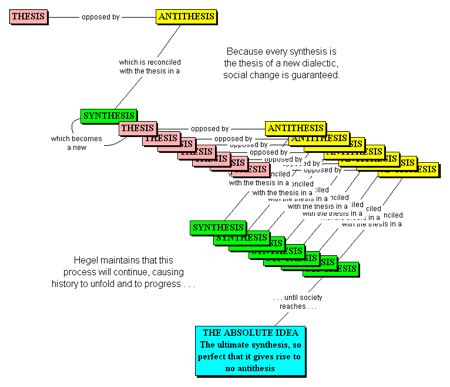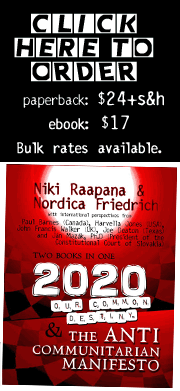


 What Is The Hegelian Dialectic?
What Is The Hegelian Dialectic?
by Niki F. Raapana and Nordica M. Friedrich
This article was originally published online in December 2002. For years it has been available to the public for free, as an educational resource. As a result it has been widely distributed with and without our permission. Now we would like to ask that you do not reproduce this work, as it is copyrighted.
The entire text of
What Is The Hegelian Dialectic? has a permanent home in our new book,
2020: Our Common Destiny/The Anti Communitarian Manifesto (two books in one), available in mass-market paperback or an affordable, downloadable e-book.
The introduction entitled
Why study Hegel? is still available here to read for free, for educational purposes.

Introduction: Why study Hegel?
Pay no attention to the man behind the curtain...
"... the State 'has the supreme right against the individual, whose supreme duty is to be a member of the State... for the right of the world spirit is above all special priveleges.'" -- Author/historian William Shirer, quoting Hegel in The Rise and Fall of the Third Reich (1959)
Georg Wilhelm Friedrich Hegel (1770-1831) was a 19th century German philosopher and theologist who wrote
The Science of Logic in 1812. For many historians,
Hegel is "perhaps the greatest of the German idealist philosophers."
In 1847 the London Communist League (Karl Marx and Friedrich Engels) used
Hegel's theory of the dialectic to back up their economic theory of communism. Now, in the 21st century, Hegelian-Marxist thinking affects our entire social and political structure.
The
Hegelian dialectic is the framework for guiding our thoughts and actions into conflicts that lead us to a predetermined solution. If we do not understand how the Hegelian dialectic shapes our perceptions of the world, then we do not know how we are helping to implement the
vision for the future.
Hegel's dialectic is the tool which manipulates us into a frenzied circular pattern of thought and action. Every time we fight for or defend against an
ideology we are playing a necessary role in Marx and Engels' grand design to advance humanity into a dictatorship of the proletariat. The
synthetic Hegelian
solution to all these conflicts can't be introduced unless we all take a side that will advance the agenda.
The Marxist's global agenda is moving along at breakneck speed. The only way to stop land grabs, privacy invasions, expanded domestic police powers, insane wars against inanimate objects (and transient verbs), covert actions, and outright assaults on individual liberty, is to step outside the dialectic. Only then can we be released from the limitations of controlled and guided thought.
When we understand what motivated Hegel, we can see his influence on all of our destinies. Then we become real players in the very real game that has been going on for at least 224 years.
Hegelian conflicts steer every political arena on the planet, from the United Nations to the major American politicalparties, all the way down to local school boards and community councils. Dialogues and consensus-building are primary tools of the dialectic, and terror and intimidation are also acceptable formats for obtaining the goal.
The ultimate Third Way agenda is world government. Once we get what's really going on, we can cut the strings and move our lives in
original directions outside the confines of the dialectical madness. Focusing on Hegel's and Engel's ultimate agenda, and avoiding getting caught up in their impenetrable theories of
social evolution, gives us the opportunity to think and act our way toward freedom, justice, and genuine liberty for all.
Today the dialectic is active in every political issue that encourages taking sides. We can see it in environmentalists instigating conflicts against private property owners, in democrats against republicans, in greens against libertarians, in communists against socialists, in neo-cons against traditional conservatives, in community activists against individuals, in pro-choice versus pro-life, in Christians against Muslims, in isolationists versus interventionists, in peace activists against war hawks.
No matter what the issue, the invisible dialectic aims to control both the conflict and the resolution of differences, and leads everyone involved into a new cycle of conflicts. We're definitely not in Kansas anymore.


"Hegel's Absolute Idea" chart courtesy of The Calverton School

To read the rest of
What Is The Hegelian Dialectic?, get
2020: Our Common Destiny/The Anti Communitarian Manifesto. Two great books combined into one mass-market paperback! It is also available as an affordable, downloadable e-book.
You will learn....
1. The origins of deductive and inductive reasoning
2. Webster's definition of the Hegelian dialectic
3. How the Hegelian dialectic changed the formula for deductive reasoning
4. Why it is almost impossible for a layman to understand the dialectic
5. The communitarian purpose for the Hegelian dialectic
6. How we interpret the history of the Hegelian dialectic
7. The Anti Communitarian League's conclusion
8. Four examples of the power of the semantics in the dialectic
9. Four different impressions of the modern Hegelian dialectic theory

Please take a moment to answer our poll...
"What prompted you to search
for the Hegelian dialectic?"














